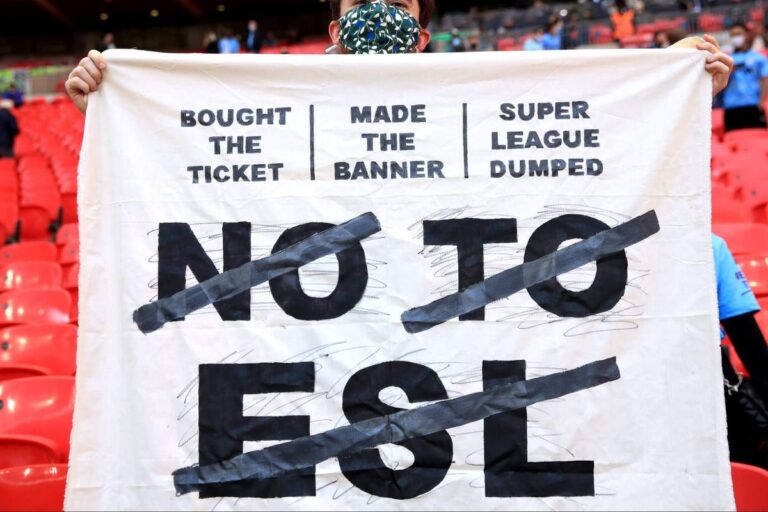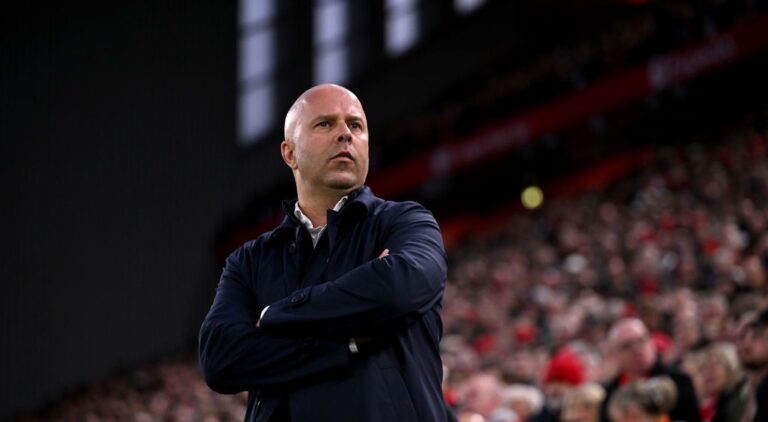
European Super League relaunches as ‘Unify League’: What’s different – and will it work this time?
The company behind the controversial European Super League idea has tweaked its proposal once more, completely scrapping the original closed-shop format, in a bid to make it more attractive to clubs and fans.
Last December, Madrid-based A22 Sports announced it was dropping its 2021 plan of creating a 20-team league, with 15 permanent members, and instead was proposing a three-league format of 64 clubs. It did not, however, reveal how teams would access that competition.
But now, after a year of what it has described as further consultation with stakeholders, it has proposed a four-league format, comprising 96 clubs, that teams would qualify for via their domestic leagues, in the traditional manner.
The proposed competition, now called the Unify League, would be divided into four leagues — Star, Gold, Blue and Union — with 16 teams each in the first two, and 32 each in the second two.

These leagues would be split into groups of eight — two each in Star and Gold, four in Blue and Union — with each team playing every other team on a home/away basis.
In the top two leagues, the top four teams in each group would then proceed to the knockout rounds, with the top two in each group in Blue and Union advancing to the last 16.
And, in a direct challenge to what it describes as UEFA’s “monopoly” on cross-border competition in European club football, A22 is also formally applying to both UEFA and FIFA, the European and global governing bodies for the game, for “authorisation” to proceed with its idea.

Real Madrid and president Florentino Perez have been critical of UEFA for several years (PIERRE-PHILIPPE MARCOU/AFP via Getty Images)
A22 believes that the governing bodies will have no choice but to grant it permission to try to establish this league — or certainly not impose any preemptive punishments on clubs interested in the idea — as last December’s landmark ruling by the European Court of Justice ruled that the response by UEFA and FIFA to the original European Super League proposal in 2021 breached European Union law.

Back then, UEFA, with FIFA’s support, threatened to expel the 12 clubs that signed up to A22’s closed-shop format from its competitions, imposed fines on them and also said it may ban any player who took part in the unsanctioned ESL from playing international football.
A22 and the three clubs who refused to drop the idea, Barcelona, Juventus and Real Madrid, challenged that ruling through the Spanish courts, who quickly passed it on to the EU’s highest court. Juventus, though, withdrew from the Super League proposals in June.
Its nuanced ruling backed the right of UEFA and FIFA to act as regulators for the game but made it clear they must wield that authority in a “transparent, objective, non-discriminatory and proportionate” fashion that does not block all new entrants to the market.
OK, so will it work this time?
A22 is confident its new proposal addresses the biggest criticism it received in 2021 from fans across Europe, but particularly in the UK, about it being a radical departure from decades of tradition, where European football is something clubs earn via their performances in domestic leagues.
It also believes that many clubs are unhappy with the so-called Swiss model that UEFA has introduced to all three of its club competitions this season and they want complete control — not a joint venture between UEFA and the European Club Association — of European club football, in the same way most of them have in their domestic leagues.
In terms of how A22 intends to fund the Unify League, its big idea remains the creation of a global streaming platform, called Unify, that would offer fans the chance to watch these games for free, with adverts, or without adverts for a fee.
Many industry experts question whether this is economically feasible, although UK-based sports streamer DAZN and FIFA have just announced that this is the business model they are trying for next summer’s Club World Cup.
Whether A22’s amended proposal will see any more clubs join Real Madrid, UEFA’s biggest critic, in backing the breakaway concept remains to be seen. The response of the European Club Association, the UEFA-backed group that represents Europe’s leading clubs, is likely to be hostile, as will UEFA’s.
But nobody can dispute that A22 has not listened to feedback and changed its offer. The question for the individual clubs will be whether they are willing to give up the certainty of UEFA’s hugely successful competitions for the promise of something that may or may not be more lucrative.

Will clubs join?
“We are talking to a sufficient number of clubs (96) to do what we propose,” A22 CEO Bernd Reichart told a news conference following Tuesday’s announcement.
“We don’t think it is essential that they support us in public when we meet in confidence and with the confidentiality that we would like to comply with. It has to be understood that these clubs play UEFA competitions and matches. Therefore, official recognition might encourage some of them to take the step, but not that they would be able to support UEFA.
“There will be no fixed clubs in the competition, with the exception of the winners.”
On when the Unfiy League might start, Reichart added: “The 2025-26 season would be too early, I don’t want to rule it out but next year seems very ambitious as we see it now.”
What has been the reaction?
La Liga, long-term critics of the European Super League, was swift to reiterate its opposition on Tuesday.
In a statement, it said that the new proposal “threatens the governance of European football by pretending to be led by some of the big clubs for their benefit, promoting an audiovisual exploitation model that would benefit a very few elite clubs and destroy the economy of the national leagues.”
It added that, in its view, the project “still has no support from clubs, federations, players, fans and institutions.”
The Premier League declined to formally comment but sources connected to the organisation, speaking anonymously to protect their relationships, claimed that the lack of clubs signed up to the new project and uncertainty over financing compared unfavourably to UEFA’s club competitions and domestic leagues.
Additional reporting: Guillermo Rai
(Top photo: Adam Davy/PA Images via Getty Images)





